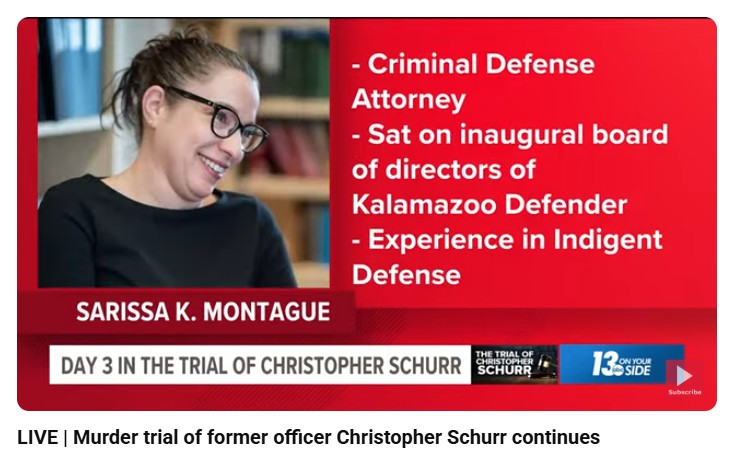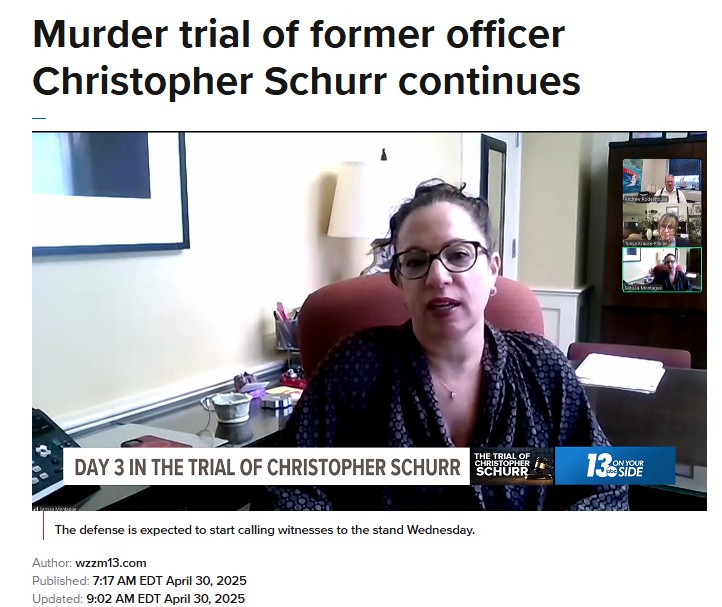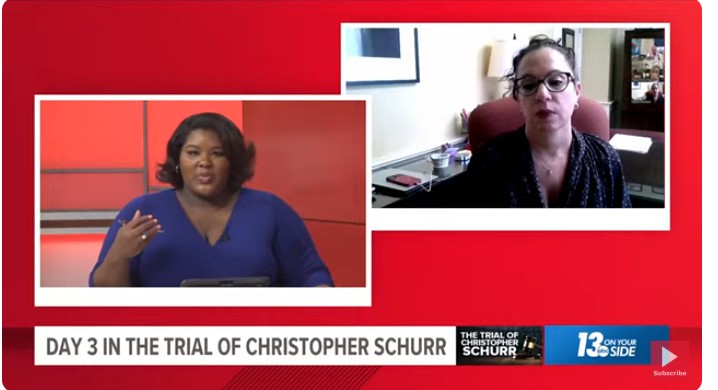
On Wednesday, April 30, Criminal Defense Attorney Sarissa Montague continued live legal expertise on WZZM 13 through its livestreaming digital platforms for the third day of the murder trial of former GRPD officer Christopher Schurr.
Schurr is charged with second-degree murder in connection to the shooting death of Patrick Lyoya in April 2022. During the courtroom’s lunch recess on Wednesday, Montague participated as a panel expert during WZZM’s digital livestream.
WZZM: What is your reaction to the motion of a directed verdict and request for a mistrial that has been presented in court?
“It’s very common, if not expected for a motion for directed verdict to be filed,” said Sarissa. “We have to do it in every case. As lawyers, what people need to remember is that we’re fighting the case and we want to win every step of the way. We’re filing things because we want to be successful. And the other thing that we’re doing though is we’re creating a record, and that record is going to be reviewed (in the case of a conviction) by higher courts – the court of appeals, the supreme court, whatever it might be. So it’s very important for us to make sure that we cover everything that we need to be doing as effective lawyers to make sure that we’re protecting our client, both in the courtroom and in that future courtrooms should that happen. That’s a reason to do a directed verdict. Again, we want to win and we’re hopeful that we’re successful. But if not, it’s also something that helps down the road should there be a down the road.”
WZZM: What would an appeal process look like?
“It’s not specific to that motion. Whenever there’s a case and the defendant loses that case and they lose at trial, they have an automatic right to appeal their loss. It goes up to the court of appeals and what the court of appeals does is reviews the entire record of a case. That consists of what happened in pre-trial and what happens during the trial. There’s not another trial at that point in front of the court of appeals – the court of appeals never gets to hear live testimony. The only thing that they can do is review the record – and again, that spans the entirety of the case and that motion is part of that record, and maybe there was a problem that should have been adjusted and it’s possible that the trial judge makes a ruling in a certain way and it’s possible that an appellate court might see the same issue in a different way and come out to a different conclusion. You have to make sure that the record is very, very strong so that the court of appeals – you never want a case to get to the court of appeals, but if it does – you make sure that that record is as strong as possible so the court of appeals has what to look for.
“I thought it was really interesting that the defense was trying to get the evidence in the way they were doing it. This was a modern-day way to doing that – but it is slow. I thought it was a strategic decision. My take is that the defense was making a strategic decision for some reason to try to get the evidence to the jury in the way that it was tried – through the experts sitting on the stand, creating the exhibits as they went forward in open court. The strategic decision is why did they decide to do it that way versus having these exhibits prepared in advance – just like the judge now has told them to do and they’re going to do it. Why didn’t they do that initially? What was the decision making in trying to perceive in the manner in which they did. That’s what I found as striking. That’s how I took it. They’re going to go back and they’re going to make the exhibits and it’s going to be fine, and they’re going to come in and show it to the jury. The judge didn’t say you can’t do it. The judge just said you can’t do it in the manner that they’re trying to do it – it’s taking too much time.
They were prepared for that. I’m 1000% confident that this was prepared – that the judge might rule that they couldn’t proceed in the manner in which they wanted to, so therefore they had a contingency plan in place. I don’t think we’ll ever have an answer about why did it start this way – but I thought it was really interesting.
WZZM: How does this effect the jury?
“The amazing, terrible, wonderful thing about trial work is you never know what’s in the mind of jurors at any given point,” said Montague. “Some jurors might have the same question that I did – why did they try to proceed in that manner rather than a different manner. Some jurors might say, why are you wasting my time, and some jurors might say that they like they way they did that and I’m sorry that we can’t proceed. We have no idea what each individual juror is thinking.”
WZZM: What are your thoughts on what the prosecution has presented so far and how the defense might bring their case to the jury
“I think the prosecution did what they intended to do and they tried to present enough evidence to a jury for the jury to find that Mr. Schurr didn’t act in self-defense,” said Montague. “They tried to take it piece by piece and only the jury will determine that. What’s going to be interesting at this point for me is going back to what we discussed yesterday (Tuesday) is are they going to establish Mr. Schurr’s fear of what was taking place without Mr. Schurr testifying.
“That’s another strategic, interesting point just from a defense lawyer’s perspective when you’re watching a case like this. It’s always at risk to put your defendant on the stand – and we talked about that yesterday. But in a self-defense case, most times you really need to. So are they going to be able to get what they need without Mr. Schurr testifying or will he have to be put on the stand. That’s what I’m really looking forward to seeing as this progresses.”
WZZM: The defense wants to present evidence about Lyoya’s intentions and character and the judge said that’s irrelevant in the case. Is this a strategic move? What are your thoughts?
“The defense is going to do everything possible to try to get character evidence in about Mr. Lyoya,” Montague said. “That’s what you want to do, but rules of evidence preclude that from happening unless you have certain things that come up that allow you to it. In the same way that we were talking about motions earlier, you try. You try everything that you possibly can to try to represent your client in the best way possible. So now they’re trying this – and again they’re trying it now. And if they get denied, it’s possible something might change in the future and they might try it again.
“There’s no ‘I’m done’ in a trial until the judge decides. But if they have an open door they’re going to take it because that’s evidence that would be helpful for the defense if it was able to be presented to the jury.”
Watch the full panel discussion starting at the 4:12:54 mark: https://bit.ly/3EJ0HeC



